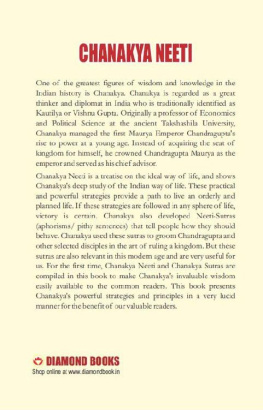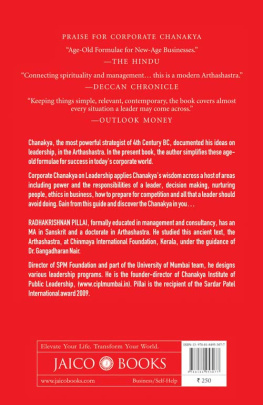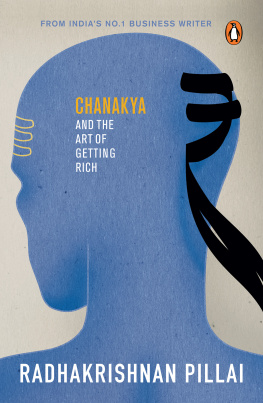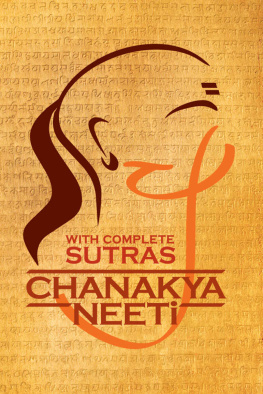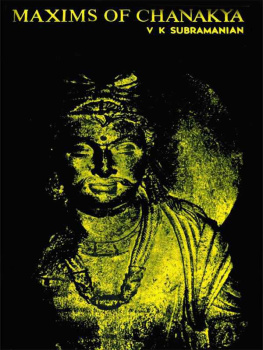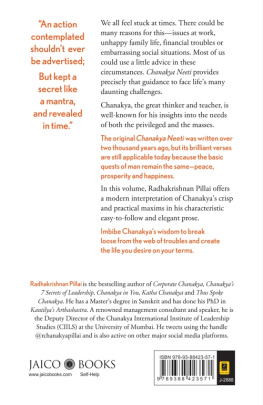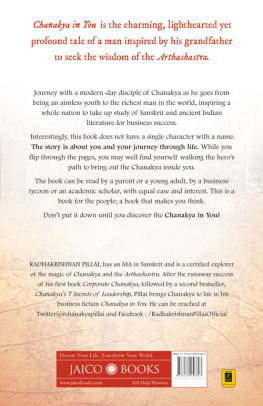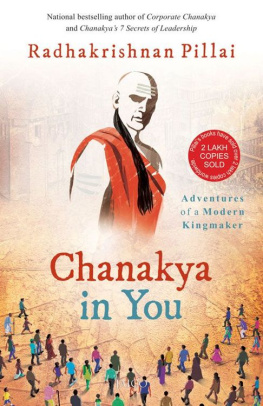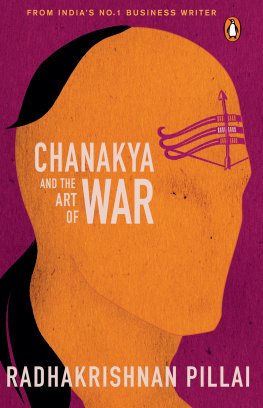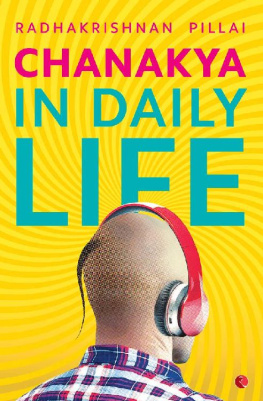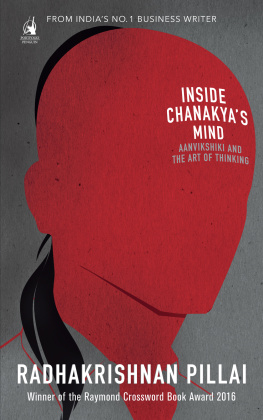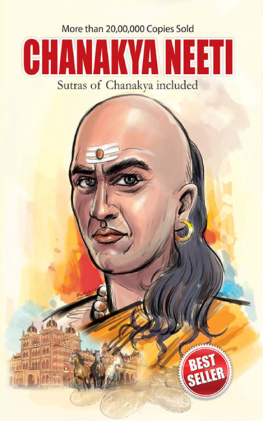CHANAKYA NEETI
(Chanakya's Aphorism on Morality)
Sutras of Chanakya included
eISBN: 978-93-5083-489-3
Author
Publisher: Diamond Pocket Books (P) Ltd.
X-30, Okhla Industrial Area, Phase-II
New Delhi-110020
Phone: 011-40712100, 41611861
Fax: 011-41611866
E-mail:
Website: www.diamondbook.in
Edition: 2013
CHANAKYA NEETI
By - B.K. Chaturvedi
Introduction
Chanakya was an epoch-making personality. It was the time when India was emerging out of the Dark Age. The old values were losing their relevance and the new were yet to be established. It was an age of confusion, which permeated every walk of the society. The Dharma , so far a guiding and uniting force, was being subjected to the contradictory interpretations. The factionalism and fundamentalism were raising their ugly heads and entering into the vitality of the social and religious norms. Taking the advantage of his confusion, Alexander of Macedon invaded India with the help of the selfish rulers of some border states. Chanakya witnessed and felt the severe trauma of this major invasion by a real foreigner. Earlier all the invaders, who attacked us eventually settled in our country itself. But Alexanders invasion was an attack of totally an alien culture and army which had strong tradition and strength of their own glorious past. But, ironically, this shattering jolt helped efface the prevailing confusion in India and expedited the emergence of a new system, which was in essence authored by Chanakya.
Chanakya was the first thinker of the ancient times who nurtured the sense of nationalism and inculcated in the minds of the people that they owed their basic allegiance to the Rajya (State of Nation) and not to the Dharma . In contradistinction to the earlier concept he made the State paramount.
He had seen that in the absence of any omnipotent religious authority the misconstrued faiths were shattering the very structure of society and morality. What was needed the total change or renovation of the system. But, there were no guiding beacons to enlighten the people about this new system. Then he wrote two significant books the Arthashastra (known as Kautilyas Arthashastra) and a collection of his observation on various practical aspects of life entitled Chanakya-Niti.
Chanakya Niti is, in fact, this great thinkers pithy observation to impart the practical wisdom to the people of his time. But these teachings are so fundamental that its relevance is almost ever lasting. Enshrined in the simple sense. Written in simple lucid language with clear thoughts, these observations have not only withstood the test of time but many of phrases, like and have become the oft-quoted proverbs of our attempt has been to bring out their full meaning and interpret them in the context of the modern times so that their undecaying relevance may be fully appreciated. To bring home the fundamentality of these sayings, we have also compared them with the prevailing modern concept. The need for these rather lengthy explanations was felt owing to the occasional terseness of these observations. Sometimes Chanakya even contradicts his own, earlier observations, perhaps to reveal the fundamental truth by sheer contradiction. At times even some of the immoral teachings are the part of this book. But they appear immoral only at the prima facie viewing. While telling what we should learn from the other beings, Chanakya says:
Prattutthaanam cha Yuddham cha Samvibhaagashcha Bandhushu
i.e., Learn from the cock the following four things: getting up at the right time, fighting bitterly, making your brothers flee and usurping their share also! Although apparently it appears down right immoral, this teaching is rooted in the instinct of self preservation which is natural. It is in this context that some of such unethical teachings are to be understood.
Although Chanakya is painted as a scheming manipulator who could stoop to even the meanest level to serve his purpose, a few of his shlokas negate this concept and present Chanakya as a sort hearted and imaginative poet. He says:
Bandhanaani Khal Santi Bahuni
Prem Rajju Krit Bandhanmannyat
Daarubhed Nipunoapi Shadanghri
Nishkriyo Bhavati Pankaj Koshe.
Meaning, there are many bondages but that of love is entirely different. The black-bee, which penetrates through even wood, gets inertly enclosed in the fold of the lotus flowers. Who can consider the author of this Shlok to be a hard hearted man?
There might be certain aphorisms which might appear objectionable to some persons, especially those who discuss the role of women in our society. Chanakya shares the same thoughts as these were prevalent during this time or are still prevalent in certain sections of our society. The entire Hindu thought gives only two positions to women: either they are adorable or they are like any other pleasure source to enjoy. The sense of companionship, which is clearly an occidental concept, is missing for obvious reasons. Well, nobody can be perfect in the world. Even the greatest thinkers of the world had some kind of Achilles heel. A man is a product of the social set up. No doubt, Chanakya tried to affect a change but even he could not get rid himself of some diehard idiosyncrasies.
Notwithstanding these minor short comings, Chanakyas teachings have great sense. One can say this not only from the textural importance of this collection but also from the end result of such teachings. Chanakya believed not only imparting instructions but also seeing their practical implementation.
History records that Chanakya not only carved out a massive empire for his pet disciple Chandragupta but also created such an awareness in the general masses that they began to talk about a Rashtra or a Nation instead of a State or a Rajya. And what could be a greater proof of the soled result of Chanakyas teaching than for a coming full millennium. No major invasion was undertaken towards the Indian borders. And the social, civil and political norms that he established had the concept of democracy in its embryonic form. Chanakya is one of those few great persons whose greatness enhances with the passage of time.
The text used in the book is taken from the standard text first published in Poona in the last century. Although every effort is made to cross-check any interpolation in it, looking to the antiquity of this treatise, there could be some still creping into it. In this collection, we have culled only those aphorisms which give a fundamental or universal message. Lastly, the translator conveys his deep gratitude to Mr. Narendra Kumar of the Diamond Pocket Books for giving him an opportunity to study and translate these pearls of wisdom.
B.K. Chaturvedi
Contents
The Individual
(The basic purpose of Chanakya-Niti is to impart knowledge on every practical aspect of life. And in this context, he has touched upon various factors dealing with faith and culture, from the individuals point of view.)
Riches, vitality, life, bodyall are fickle and fey; only Dharma is constant and everlasting.
*
Gods abode is not the idols of wood, stone or earth. He dwells only in feeling.
*
But, even if one puts ones faith in the idols of gods made of metal, wood or stone and worships them with total devotion, one is awarded with the desired result.
*
Anger is death, Lust is (the river of hell) Vaitarani, Knowledge is the cow of plenty and Satisfaction is (the divine orchard) Nandanvan.
Prayer
Pranammya Shirsaa Vishnum Trailokyaadhipatim Prabhum.

